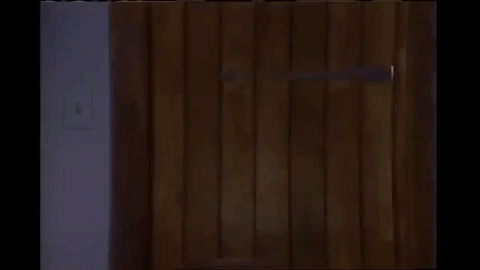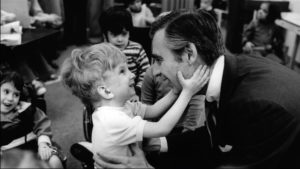 Won’t You Be My Neighbor is a story about a singular, unique man. He was vilified by some as coddling or a trifle; he was held up by others to be, as his son put it, the “second Christ”; but he was beloved by many and affected even more. The story the film tells is as singular and focused as the man himself. And it might be the most important film of the year.
Won’t You Be My Neighbor is a story about a singular, unique man. He was vilified by some as coddling or a trifle; he was held up by others to be, as his son put it, the “second Christ”; but he was beloved by many and affected even more. The story the film tells is as singular and focused as the man himself. And it might be the most important film of the year.
The documentary welcomes you into the life of Fred McFeely Rogers from the 1960s until his death in 2003, largely centered on the lifespan of his Peabody-award winning children’s television show. And it extends that welcome the same way Rogers himself welcomed generations of children: with Rogers’ own voice, singing “It’s a beautiful day in the neighborhood…”
From there, documentarian Morgan Neville gathers Rogers’ closest neighbors to spin the tale of a man who is exactly who you think he is. It’s a warts-and-all documentary about a man with few warts. I loved it and was moved by it, from the beginning to the end; there’s just something warm and charming about such an earnest, honest person.
And I think it’s a story that everyone needs to see. It’s funny, but far from mean. It’s authentic, but it’s neither dark nor gritty. It’s kind and full of delight, but it acknowledges the hardships of a real life. It radiates empathy and made me feel and think about myself and how I interact with others. It encourages listening, talking, and growth.
In short, the film is a fitting tribute to Rogers because it’s just like the man. Both of them are built on an unwavering, believable promise: “I like you just the way you are.”
A Snappy New Imago Dei: The Dignity of Life
 That insistence, that assurance that every life has value and dignity, is not uniquely Christian, but it is particularly Christian. And as an ordained Presbyterian minister, Rogers would surely have known the technical term for the doctrine – Imago Dei, or “the image of God.” It’s a doctrine that forms a cornerstone of our faith: we were made in the image of God, and He imbued us with dignity and worth. We have inherent value from birth, and that means something.
That insistence, that assurance that every life has value and dignity, is not uniquely Christian, but it is particularly Christian. And as an ordained Presbyterian minister, Rogers would surely have known the technical term for the doctrine – Imago Dei, or “the image of God.” It’s a doctrine that forms a cornerstone of our faith: we were made in the image of God, and He imbued us with dignity and worth. We have inherent value from birth, and that means something.
When God was making all things in the book of Genesis, He called His creation “good” at the end of every day – but it was only after He created humanity, the only part of His creation that was made in His image, that He called it “very good.”
“Then God said, ‘Let us make man in our image, after our likeness…And God saw everything that he had made, and behold, it was very good.” (Genesis 1:26, 31 ESV)
Rogers insisted that “those who would try to make you feel ‘less than’ who you are — I think that’s the greatest evil.” And he’s right. Satan insists that we’re something ‘less than’ people made in the image of God, by enticing us to sin. It’s the most evil thing He can do to God’s creation, because it would result in our destruction.
But God looked upon us, the crown jewel of His creation, and He loved us before we ever had the chance to deserve it; because we hold the image of God. In fact, some theologians believe that the Imago Dei we carry is what God loves about us. But it’s not some garment we put on; it’s a core part of who we are, maybe the most inherent part of our nature.
 While the Imago Dei is inherent, it doesn’t come from within us. It was placed there by God Himself, not based on our performance, so there’s nothing we can do to lose it or to gain more of it. We carry His image, His love, and His value with us wherever we go and whatever we do.
While the Imago Dei is inherent, it doesn’t come from within us. It was placed there by God Himself, not based on our performance, so there’s nothing we can do to lose it or to gain more of it. We carry His image, His love, and His value with us wherever we go and whatever we do.
That’s why Rogers could say, “It’s you I like–every part of you. Your skin, your eyes, your feelings, whether old or new.” Whether old or new, whether you change or not, whatever’s going on in your heart and your life, you have inherent worth and value, and you are worthy of love.
It’s A Sanctifying Day in the Neighborhood: The Destiny of Life
But while God and Mr. Rogers like you the way you are, they do not want you to stay that way. In fact, it’s because they love you unconditionally that they want to see you become better! Rogers’ TV show was nothing if not an affirmation of worth and an encouragement to grow.
See, the Imago Dei not only confers upon us dignity, but also destiny: we are given the ability and the potential to do incredible things. We can become better; our life trajectory can change; everything about us can improve, not to gain the favor of God, but because He already loves us completely. He loves us until we’re lovely.
And that’s not just a perk, it’s what our lives were meant for. God gave us His image so that we could become more like Him. We were made to seek Him. We were made to be more than sinful, made to be more than disconnected creatures who don’t know our Creator.
 Mr. Rogers knew we could be more. That’s why He spoke to children; the Imago Dei is not conferred at adulthood, and children have worth and value, too. Rogers took seriously God’s command to “seek the welfare of the city where I have sent you into exile” (Jeremiah 29:7, ESV) – he called the command being “repairers of creation,” and when he was ordained by the PCUSA in 1963 it was as an “evangelist to television.” So he threw himself into the job of teaching children their worth and value, with the hope that those he reached would “express their feelings in ways that [would] bring healing in many different neighborhoods.”
Mr. Rogers knew we could be more. That’s why He spoke to children; the Imago Dei is not conferred at adulthood, and children have worth and value, too. Rogers took seriously God’s command to “seek the welfare of the city where I have sent you into exile” (Jeremiah 29:7, ESV) – he called the command being “repairers of creation,” and when he was ordained by the PCUSA in 1963 it was as an “evangelist to television.” So he threw himself into the job of teaching children their worth and value, with the hope that those he reached would “express their feelings in ways that [would] bring healing in many different neighborhoods.”
Neighborhood healing was obviously a core part of Rogers’ philosophy, enough so that it affected the name of his show. The neighborhood was his mission field; the place where people gather in community, the place where residents could go for help, the place where good things and bad things and important things happen. And the place where things happen to all of us together in community.
We’re made to reflect the image of God in our communities; to show how great God is to those around us, and to heal our neighborhoods by reflecting the Imago Dei.
He Makes Every Day Holy, By Just Him Being Him
Fred Rogers believed, unflappably, in the dignity and destiny of each one of us. He loved us as we are, but always encouraged us to grow and be a force for good. But, as Fred knew, we don’t have enough power in ourselves to live up to this reality; we can’t fully comprehend the Imago Dei, or produce the sanctification that it calls for in our hearts.
Thankfully, that’s already been done for us.
See, while we carry a shadowy, dim form of the Imago Dei, there is One who holds the exact image of God. Jesus, who died to show us our value and to secure our sanctification, is “the image of the invisible God, the firstborn of all creation.” (Colossians 1:15, ESV)
Like Rogers, Jesus loves us as we are, and seeks our growth – but He does it perfectly. And He did something Rogers never could – He died and rose again for us, while we didn’t deserve it, in order to bring us into His neighborhood.
The best movies, like the best people, point others to that Neighbor. And you’ll find it in Won’t You Be My Neighbor.



1 comment